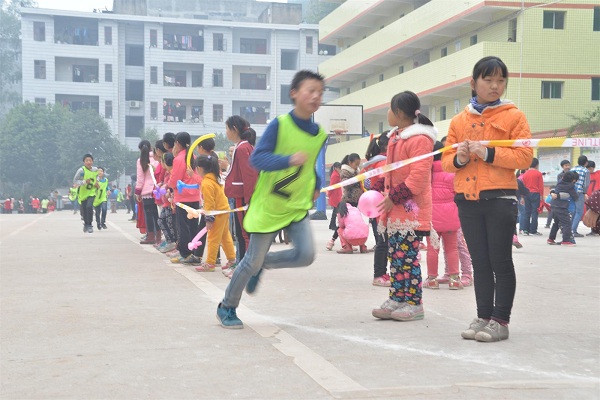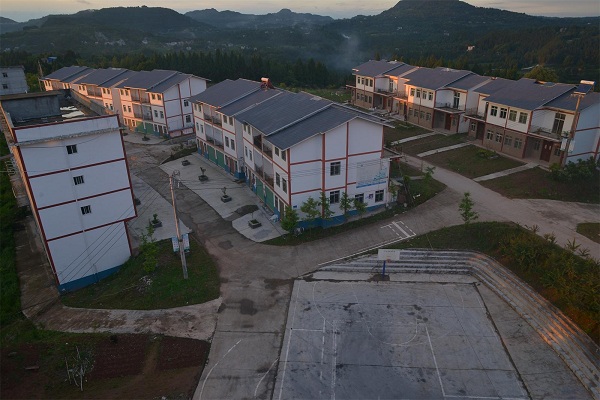The Second Original Writing Competition
Junior High School Group
Platinum Award
Written by
Wang Jing, Central Primary School, Yinja tSichuan Province, China
Date: May, 2017
My childhood, a mixed adventure drifting hither and thither, has left clear footprints along the way. For me, each and every one of these footprints is a singularly beautiful and cherished memory.
Harvest season fills the air with the sweet aroma of wheat that invariably sends my thoughts wandering back to that year.

Grandpa and Grandma were already up and busy one morning, with she busily cleaning the dusty stone mill and he busily removing the unwanted bits from the good grain. I sat on a stool busily rubbing my still-sleepy eyes and pestering Grandma with questions about what they were up to.
Hearing Grandma tell me that she was getting the mill ready to make flour made me nearly jump straight up from my stool. This was going to be great! I had never seen flour being milled. I had to see this for myself! My plans made, I rolled up my sleeves and joined in the morning’s bustle.

How was I to know that my ‘help’ that morning would simply compound my grandparent’s workload. First, I poured a ladle of water onto the mill that Grandma had washed and just finished drying. Next, I poured a second ladleful onto Grandpa’s pile of good wheat. The fruit of my efforts was sour looks from everyone in the room. After jumping around awhile longer, their patience gave out and I was told sternly to return to my stool and sit still!
I had no choice but to sit in boredom. I decided to count ants to kill time. But, my curiosity wasn’t extinguished so easily. I slowly moved the stool until I caught sight of the turning mill. At this point, the ‘ants’ that were dancing inside of me finally got the best of my failing self-control. I stood up and walked over to the mill, where I started coyly trying to strike up a conversation with Grandma. My eyes, however, never left the mill. I didn’t want to miss seeing how flour was made. Grandma was busy and only distractedly engaged in conversation with me. In watching the goings on, I finally realized that wheat didn’t need to be soaked to make flour and that the mill produced the flour that would later be collected.

Seeing how Grandpa and Grandma turned the mill so fast, I wanted to try it myself. Grandma agreed with a laughing smile and asked Grandpa to bring the spinning mill to a halt. I think she was looking forward to what would happen next. I was taken aback when I put my weight against the handle and the mill didn’t budge at all. It was then that I realized why Grandma had chuckled at my request. Ashamed, I heard a voice beside the mill say, “Accomplishing any task is always more difficult than it looks.”
Although defeated, I didn’t hide away in shame, but rather turned these words over in my mind. I’d never before believed that you could make flour from wheat grits. Like someone had turned on a lightbulb, the word ‘difficult’ reverberated in my head, evoking images of sweat dripping off the brow and the imagined sound of a hoe striking the earth …
As the mill spun ceaselessly beneath the sun, although it seemed like a half-century of time had slipped by, there were still rough kernels of wheat in the flour. The monotony of it all was severely testing my patience.
“Grandma,” I asked with a grumble, “why are you using the stone mill? It’s so slow!”
“The electricity is off today, so the mill in town is closed,” she said, stopping the mill and wiping the sweat from her brow. “If you hadn’t told us yesterday how hungry you were for flatbread, your Grandpa and I wouldn’t be doing this now.”
Grandma’s words sent a shiver across my soul and my thoughts of pulling away dissipated. Seeing Grandpa and Grandma working so hard had shamed me into silence.
The stone mill eventually transformed all of the wheat into flour. The rich aroma of freshly ground flour filled the air and curbed my unease. Grandma’s nimble hands collected the snow-white powder and, despite her sweat-soaked brow, her age-lined face beamed with delight.
That afternoon, I ate flatbread so delicious. I dare say it was worth dying for. Seeing my grandparents toil at the stone mill has given me greater appreciation for the true message of the poem “Sympathy for Peasants”.
The stone mill ceaselessly turns; thoughts slowly drift; crossing mountains and seas; perspiration tumbles groundward …
Comments of Reviewer 1
The author’s story about her experience with a stone mill is vivid and engaging. The story’s details illustrate the hardships involved in grinding wheat and the sentence “Accomplishing any task is always more difficult than it looks” is used quite aptly here. The protagonist’s obliviously asking her grandparents why they are working so hard, only to find out that they are doing this all for her, highlights the important aspect of love, giving this essay an additional level of interest and meaning.
Comments of Reviewer 2
This essay uses the author’s experience turning a stone mill with her grandparents to highlight several themes, including the love of grandparents for their grandchildren, the toils of farming families, and thoughts on the relationship between labor and reward. The source material is engaging, the details are realistic, and the subject is profound. This is truly an excellent essay.
